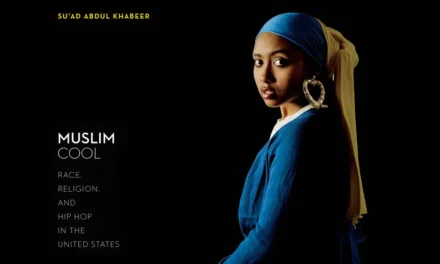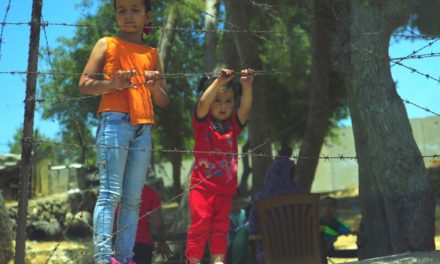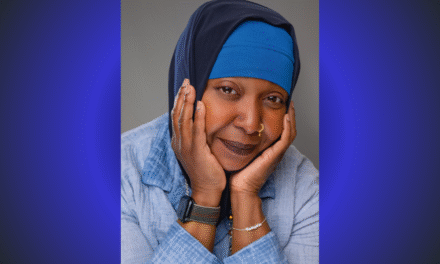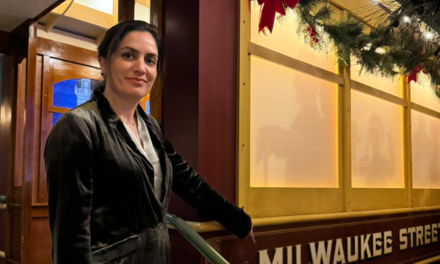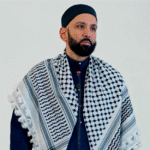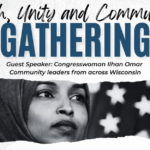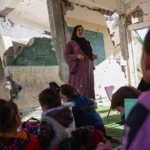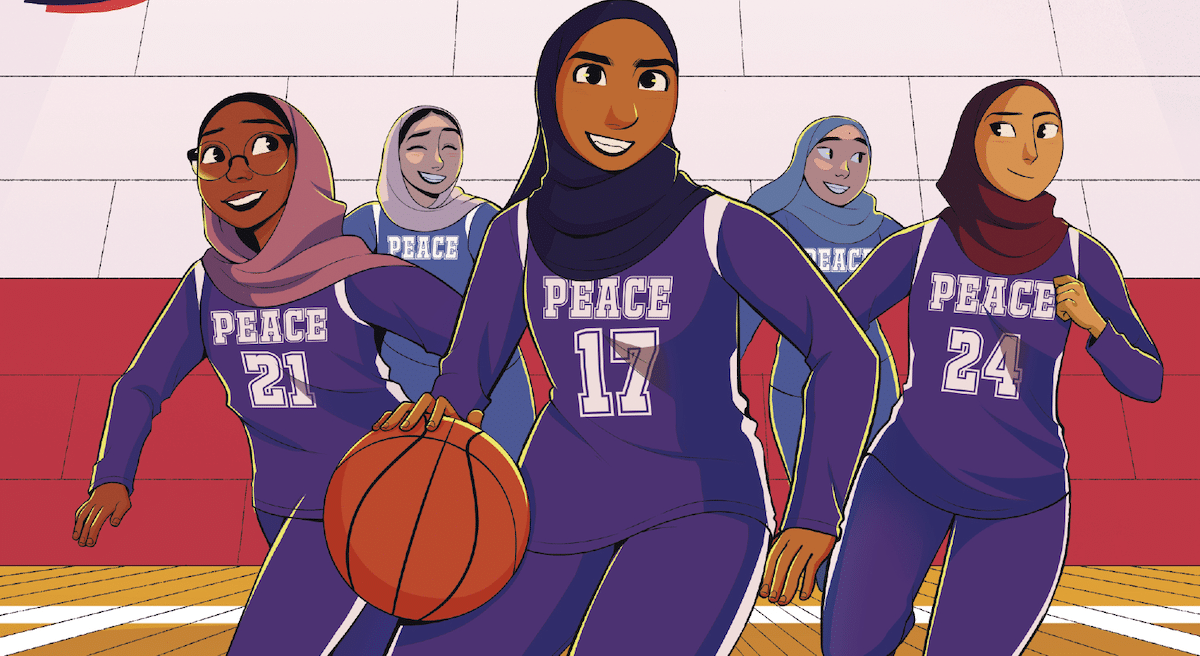
Illustration by Safiya Zerrougui
Salam School Girls Basketball Team, one of the first all-Muslim girls’ high school teams in America, garnered national media attention in 2018-19, catching the attention of writer Hena Khan, who featured the Stars in her first graphic novel.
Inspired by the real-life story of Milwaukee’s Salam Stars, the all-Muslim, hijab-wearing Milwaukee Salam High School Girls Basketball Team, award-winning author Hena Khan penned We Are Big Time, a graphic novel debuting next week.
“This graphic novel goes big with humor and heart as it explores culture and perceptions, fitting in and standing out, and finding yourself, both on and off the court,” says a press release from publisher Penguin Random House.
Khan’s graphic novel, with debut illustrator Safiya Zerrougui, goes on sale Aug. 6. The paperback will be sold for $13.99 at Boswell Books, Barnes & Noble, Target, Walmart, Amazon and many other platforms and stores. Although marketed for ages 8-12, Khan told Wisconsin Muslim Journal she wrote it to appeal to ages 8 and up. She expects teens and adults will also find it interesting.
The Pakistani American writer is the author of the middle-grade novel Amina’s Voice, which was selected as a 2017 Best Book of the Year by Kirkus, NPR, Washington Post and Chicago Public Library. Her other titles include Amina’s Song, Drawing Deena, More to the Story, the Zara’s Rules series and picture books Golden Domes and Silver Lanterns, Under My Hijab and It’s Ramadan, Curious George, among many others. She lives in her hometown of Rockville, Maryland, with her family.
Milwaukee Muslim Women’s Coalition, Salam School Athletics, Milwaukee Public Library and Boswell Books are sponsoring a book talk with Hena Khan at 2 p.m., Sunday, Sept. 15, at Centennial Hall at the Milwaukee Public Library in Milwaukee. Enter Centennial Hall at 733 N. 8th Street. (There is no entrance from within the library.) For free tickets, register here.
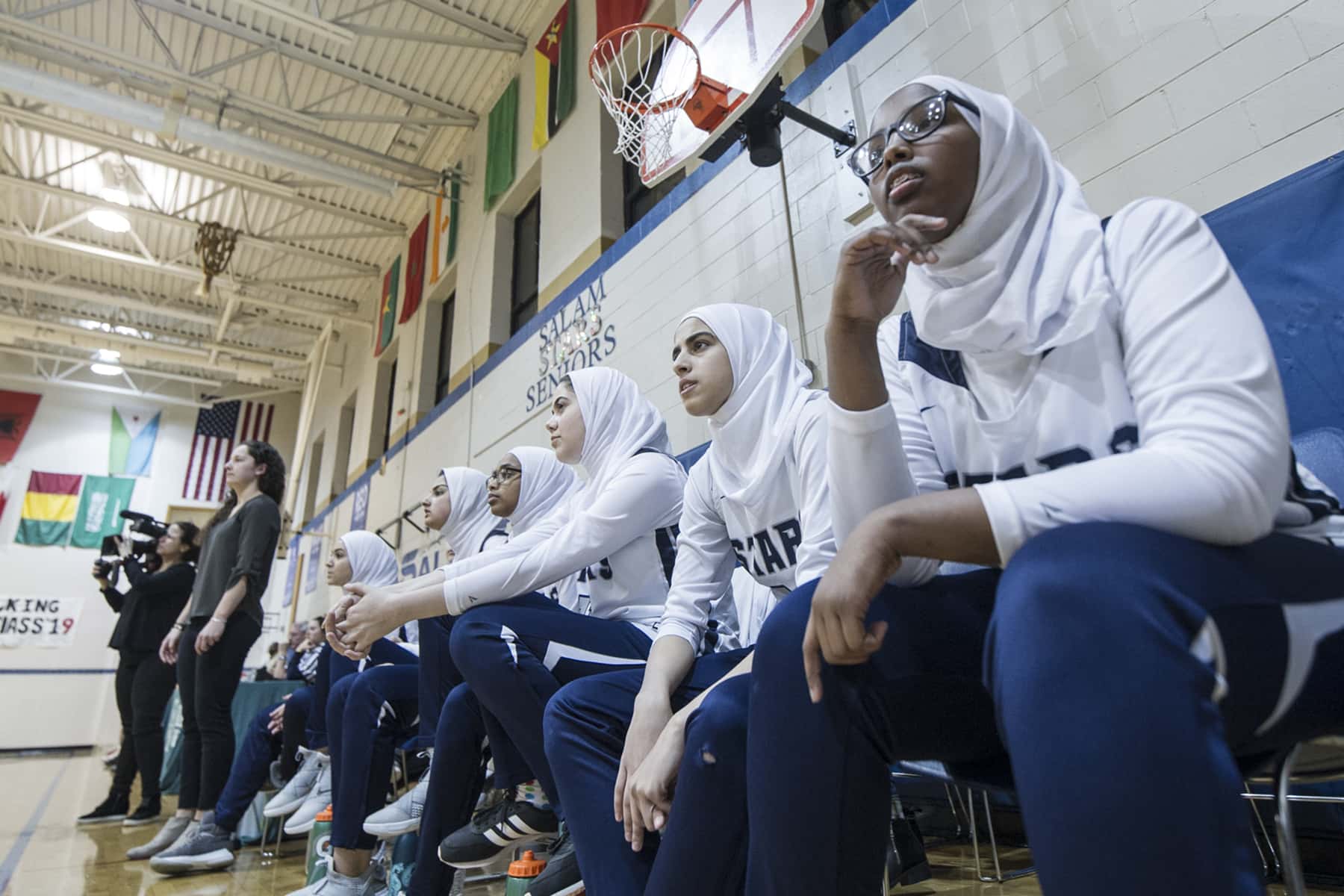
Coach Kassidi Macak (left) taught basketball basics to the Salam Stars. Not a Muslim herself, Macak said she learned a lot about Islam from the players.
An interview with award-winning author Hena Khan
WMJ interviewed Khan recently about her inspiration for We Are Big Time, writing her first graphic novel and what she hopes her new book brings to readers. See the paraphrased highlights of the interview below.
When WMJ wrote about your visit to Milwaukee in 2021, you said you were working on a graphic novel set here. It must have been your new book We Are Big Time, right?
Yes, it was! I wrote two other books set in Milwaukee. I have family in Milwaukee and connections to the city.
I was invited to the Wisconsin State Reading Association conference in February 2020, right before the pandemic. The educator who invited me emailed details about the conference. As a footnote, she said, “This popped up in my inbox today. I thought you might find it interesting.” It was a link to a video about the Salam School team. I looked up more stories about them. They were getting a lot of coverage. I was so taken by this team and their experience. It just instantly felt like a story I wanted to share in book form.
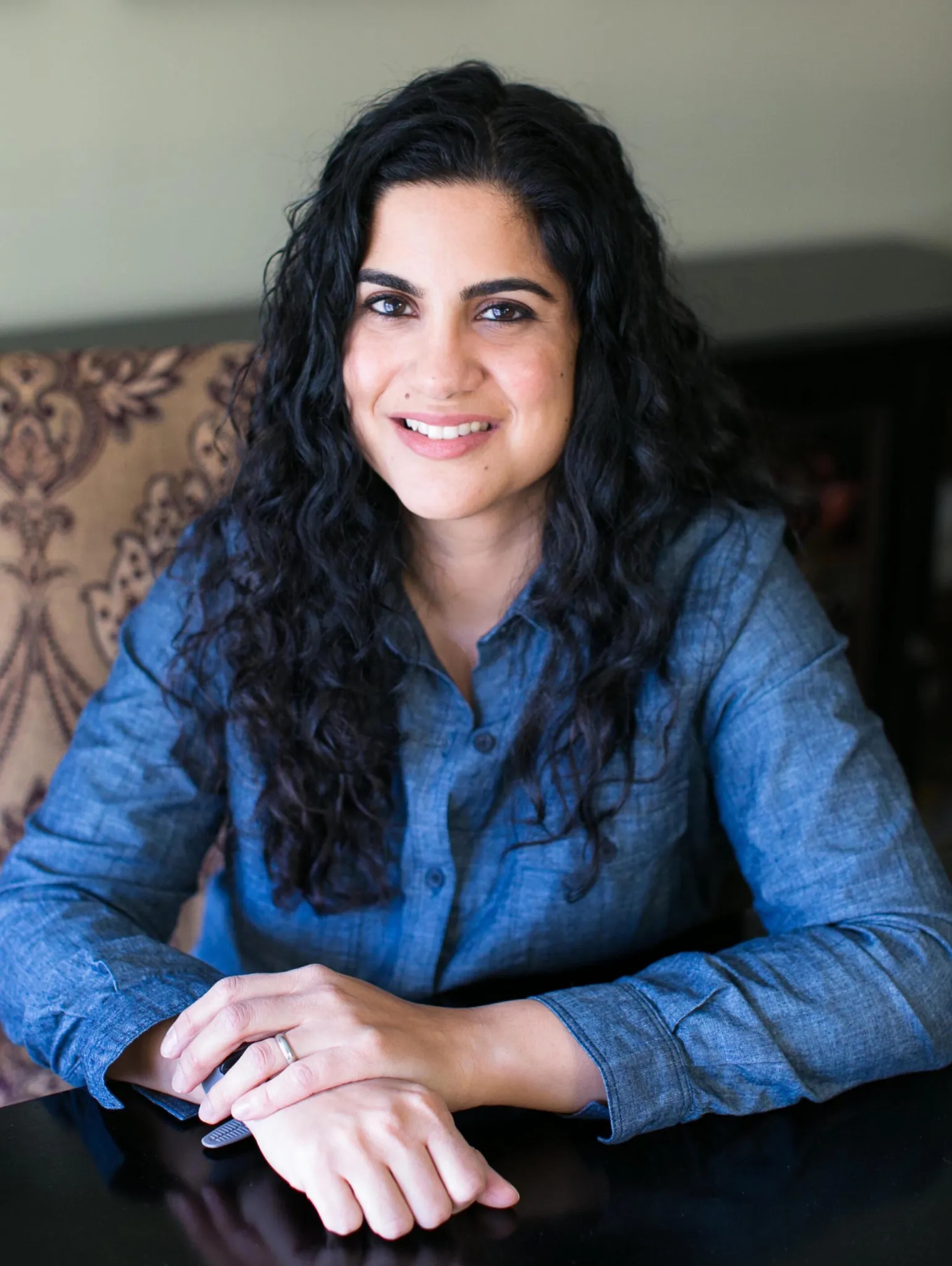
Photo by Zoshia Minto
Award-winning author Hena Khan is known for creating unapologetically Muslim characters.
What was it about the Salam Stars that made them a good story?
It felt so cinematic with characters readers could get behind and root for. In many ways, it is a classic sports turnaround story, where the underdogs become champions, but not in the typical way.
How did you pursue the story?
I reached out to Salam School and asked if I could get in touch with the coach. The secretary immediately connected me to Coach Kass (Salam School Co-Athletic Director Kassidi Macak). She was so responsive and eager to help. I interviewed Coach Kass. Then she connected me to four students on the 2018-2019 team.
Speaking with them, I got a sense of their experience from what it was like to be on the team to their motivations for playing, what it was like to have Coach Kass as their coach and other pieces of their lives.
What captivated me about the Salam Stars and made me want to base a story on them was the way they worked together as a team, their perseverance and resilience, their positivity. It all provided a great backdrop for the story I wanted to develop.
Was your main character Aliya based on one of the girls you interviewed?
She is definitely a composite created from the stories the girls told me. One mentioned she had moved and was new to the school. They all talked about the stresses of balancing school and practice. Another talked about always being hard on herself. My character Aliya focused on her mistakes and let them consume her focus. I added some fictional events.
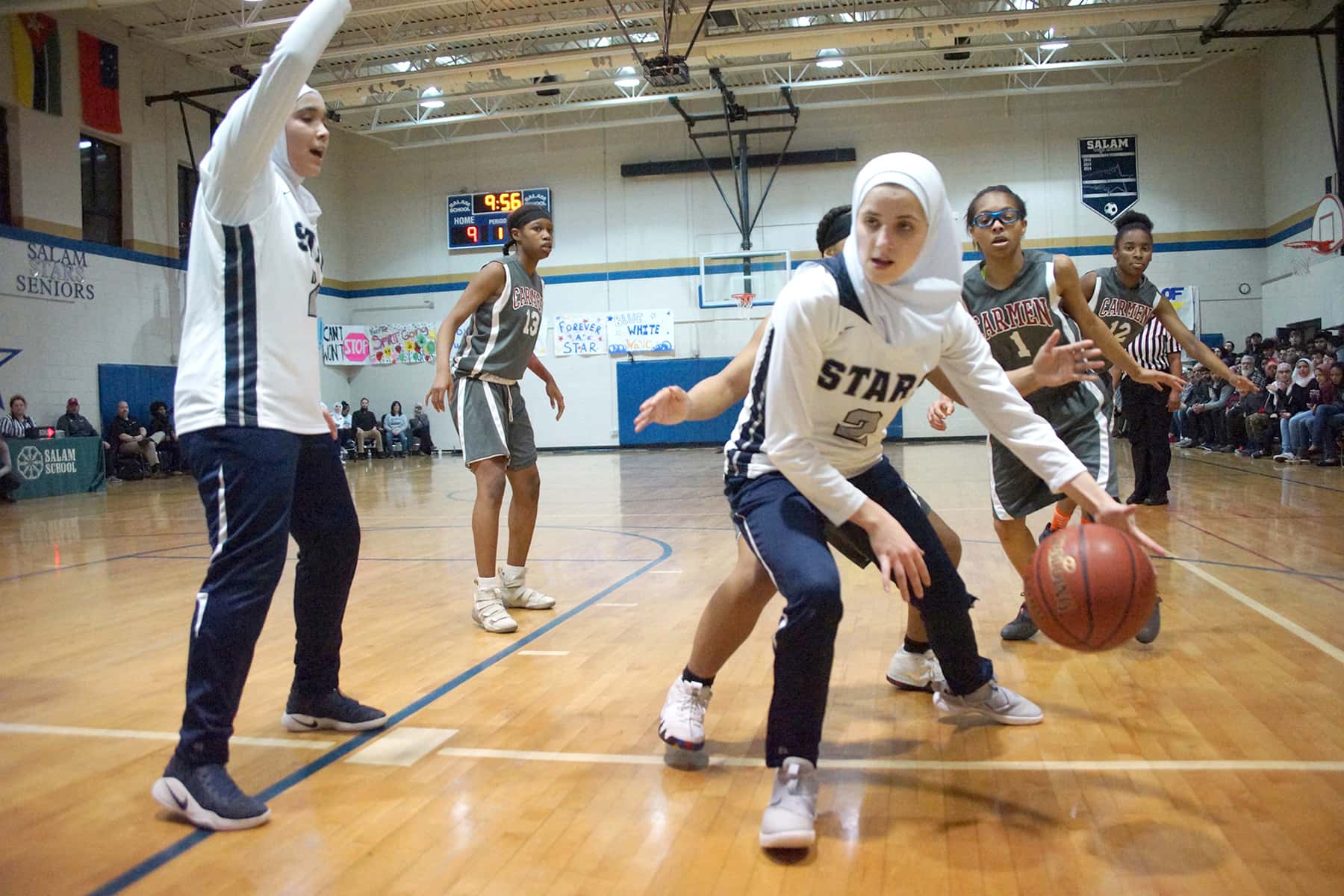
Did you consider writing a nonfiction book about the Salam Stars?
It didn’t occur to me. I like the idea of writing a book based on a true story but having the creative license to add elements that help me build the story I want to tell. I wanted to explore what it meant to the girls themselves to receive all the attention they did and to feel the weight of representation thrust on them, and even to question the way their story was being told in the media. Having a character who was an amalgamation of the things I heard from the players let me highlight the aspects I found most interesting.
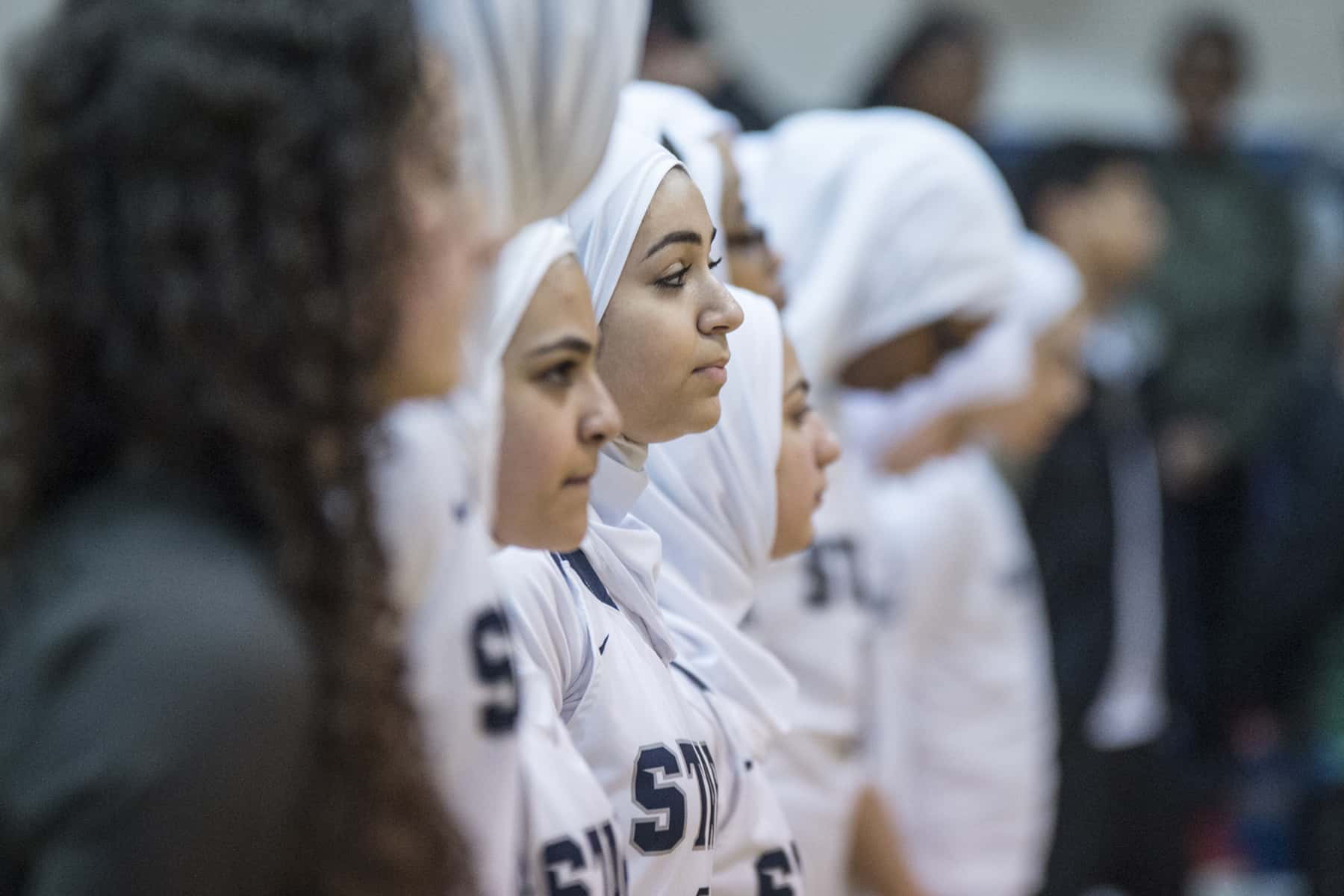
Media coverage of the Salam Stars often focused on overcoming discrimination, which was not a major issue for the team, author Hena Khan discovered.
What story did you want to tell?
I saw the chance to make a full narrative arc about the main character, Aliya—the way she changed and grew through the experience of coming new to the school to finding friendship to being on this team to learning how to manage competing interest and learn to be a leader.
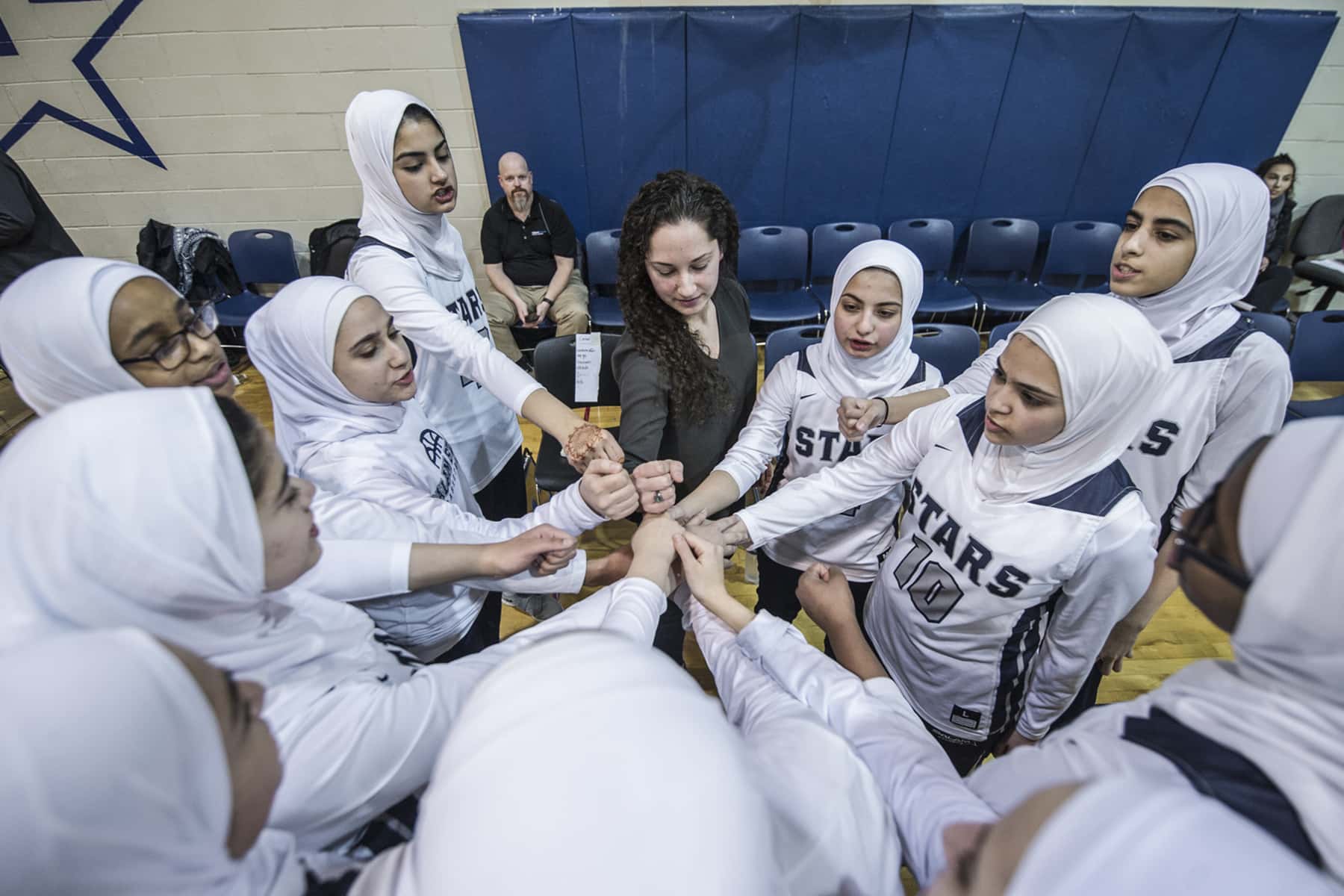
One characteristic of your work is telling stories about Muslims where being a Muslim is not the main issue. Is that true in this story?
Absolutely. A common theme in media coverage about the Salam Stars was overcoming discrimination. When talking with the girls I was surprised to learn they didn’t think it was really that bad. They weren’t necessarily trying to overcome obstacles related to who they are or what they wear; they were focused on learning to work together as a team and mastering the fundamentals of basketball.
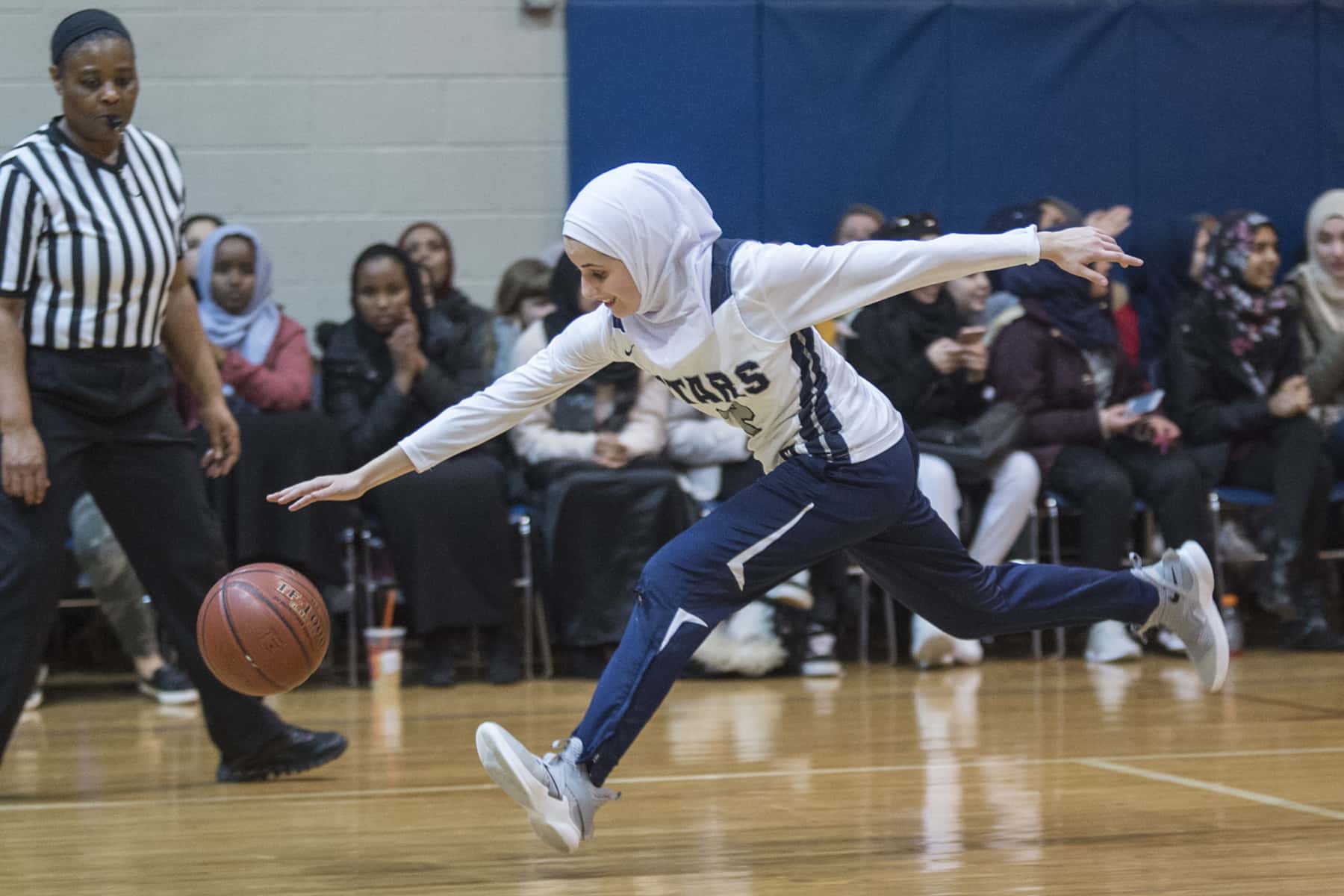
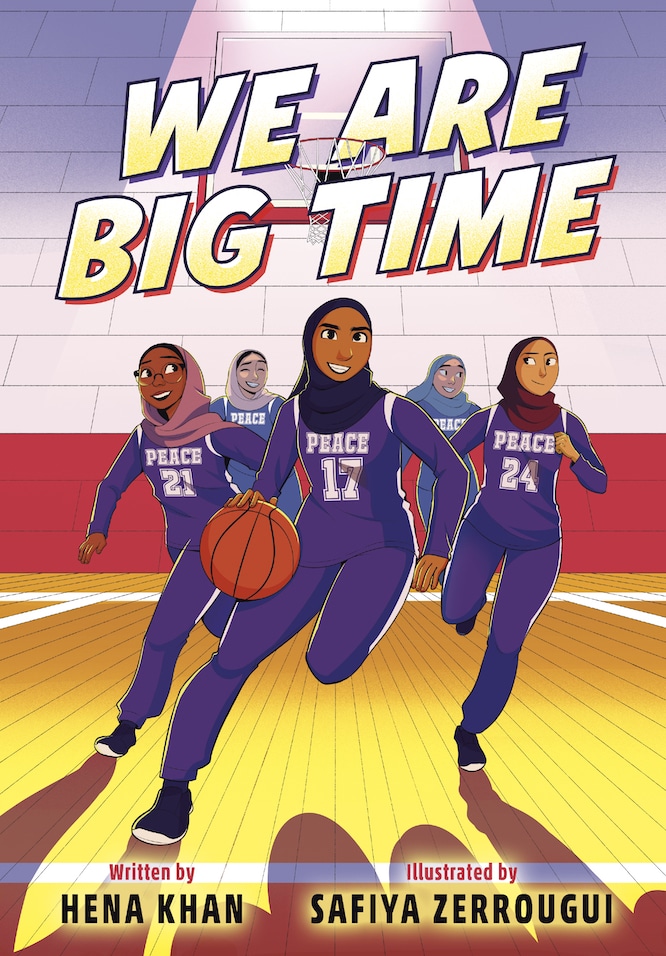
You have said one reason you write the stories you do is because they are stories you wish you could have read as a Muslim growing up in America. Is We Are Big Time a book you would have wanted to read as a child or teenager?
Yes, absolutely. As an American Muslim who enjoyed playing sports, I would have found this story incredibly inspiring. The confidence and comfort these girls felt in their own skin, something I didn’t have, would have made them great role models for me. To wear their identities with such pride and to have being Muslim a non-issue in their lives is a really powerful thing to witness. They were aware of their difference—being Muslim—but that wasn’t their only story. I believe stories can help you feel seen, feel validated and feel like you matter.
Why did you decide to make it a graphic novel?
A graphic novel came to mind because of the powerful imagery I was seeing, not only in newspaper articles with photographs but also the video I watched. I saw these girls with their passion for basketball and their hijabs. I heard them speak for themselves.
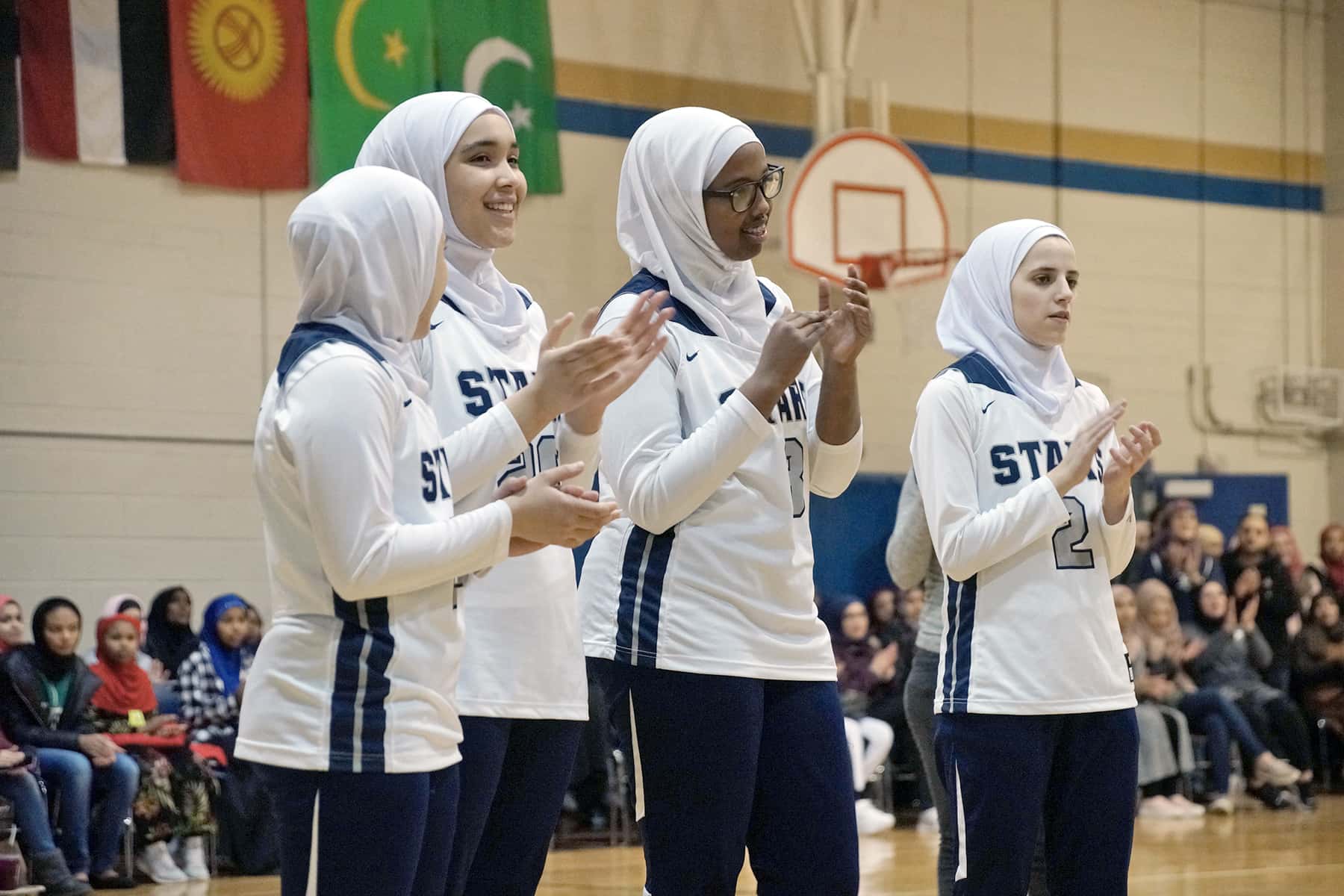
How did you like writing a graphic novel?
It was definitely a learning curve for me. In 2016, I took DC Comics’ inaugural talent development workshop. I learned to tell a story in panels instead of in paragraphs, using dialogue and art showing action to move the story forward cinematically. It felt a lot like writing a screenplay for a film but not being limited by a budget.
I enjoyed the format. Now I’m working on my second graphic novel.
I want to continue writing graphic novels because I see their value, not to mention they are really fun to write. I know sometimes parents can be reluctant to have their children read graphic novels because they don’t consider them as challenging as a regular novel in prose. I would argue there is a lot to be gained by reading graphic novels. All the elements of storytelling—like rich character development and an exciting story arc—are there but you can get through them a lot faster. Many readers go back and reread over and over. In doing so, they discover many new things. I strongly believe if you cultivate reading in any form and get kids hooked on books, they have the opportunity to develop a deep passion for reading.
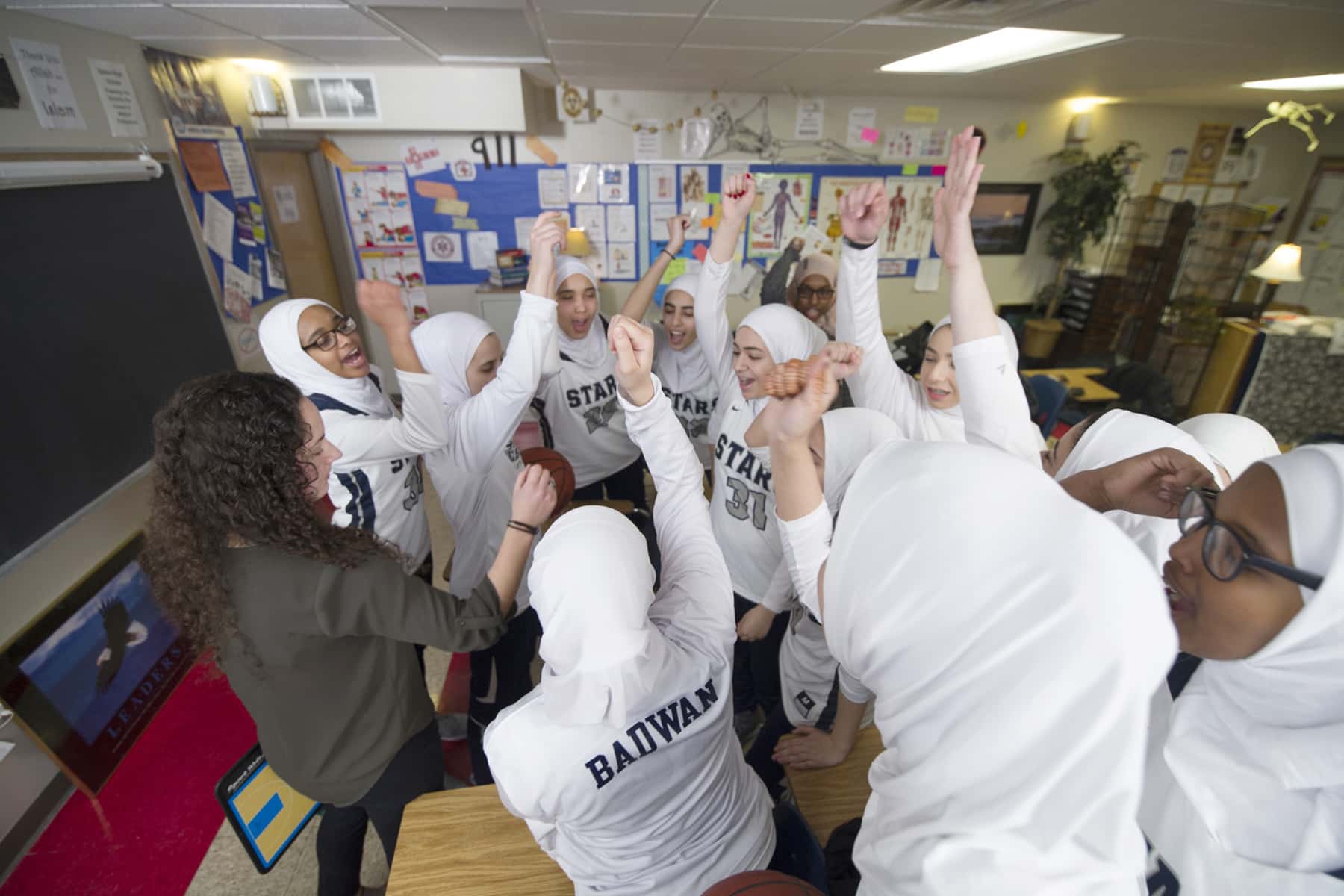
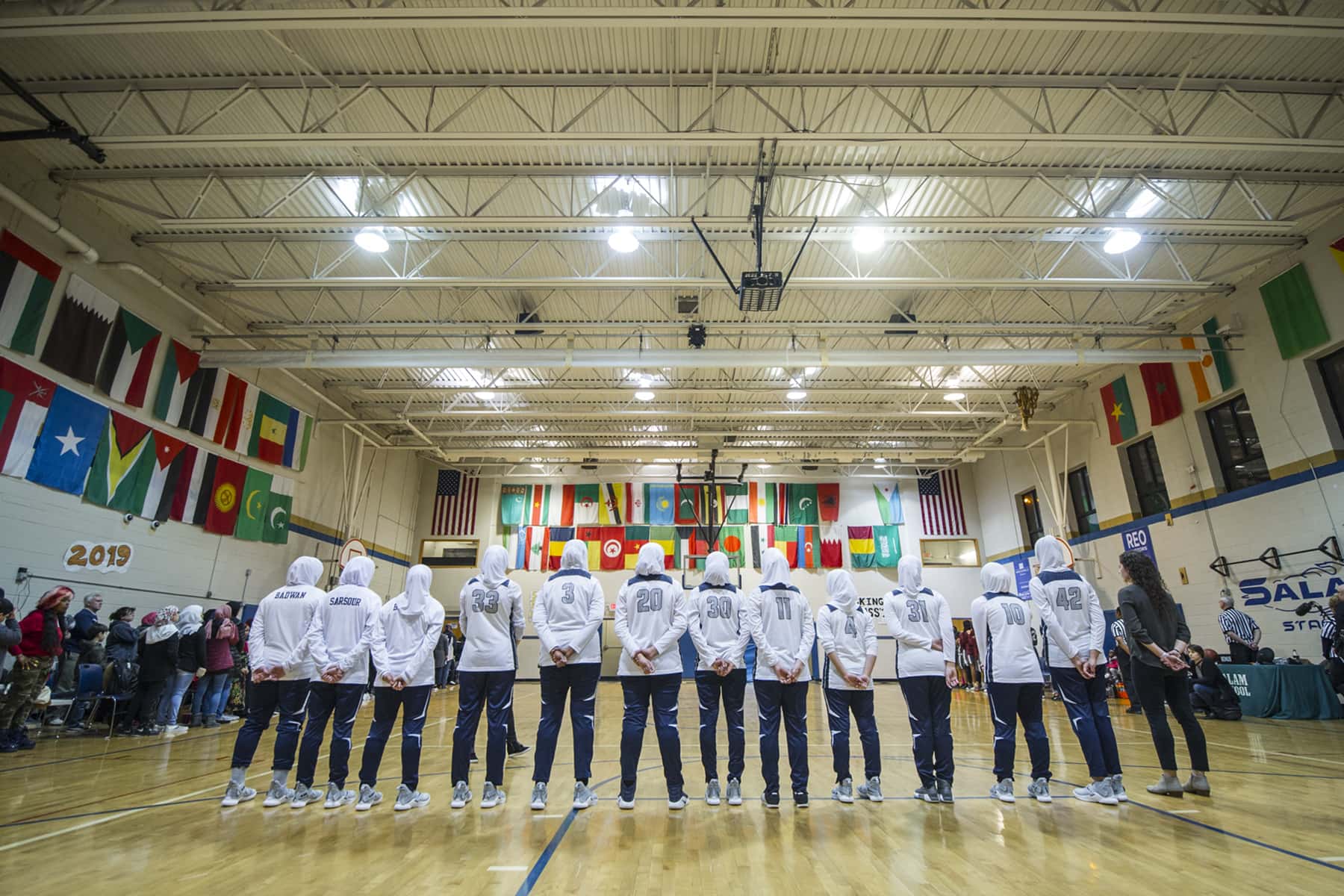
The 2018-19 Salam Stars, with a winning record of 13-4, gained national and international media attention as a rare all-Muslim, hijab-wearing high school girls’ basketball team.
